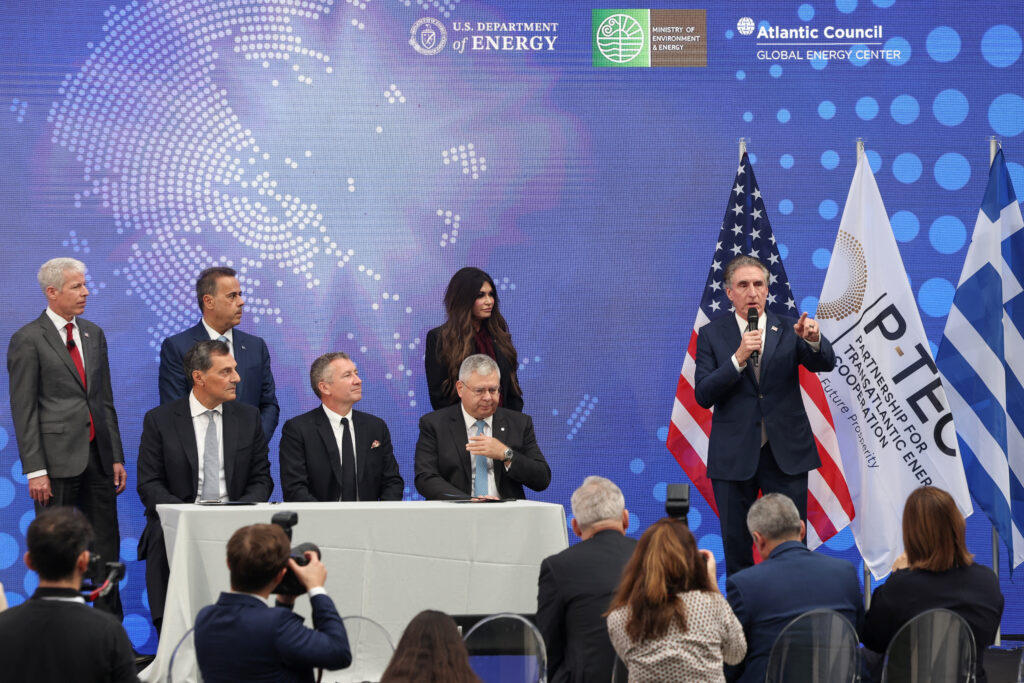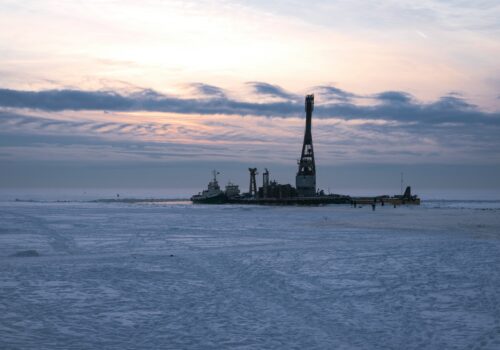Watch the full event
Take it from US Energy Secretary Chris Wright: “Where you get energy from matters.”
Wright spoke in Athens on Thursday at the sixth convening of the Partnership for Transatlantic Energy Cooperation (P-TEC), a ministerial gathering hosted by the US Department of Energy, the Ministry of Environment and Energy of Greece, and the Atlantic Council’s Global Energy Center. There, he spoke with Stavros Papastavrou, Greece’s energy and environment minister, about Europe’s energy security as the European Union (EU) works to advance a proposal to ban Russian gas imports.
“Funding aggression is not good,” Papastavrou said. “We believe strongly that for the stability, the peace, and the prosperity of the region, we need to totally phase out from Russian gas.”
On the P-TEC stage, energy companies Energean, HelleniQ Energy, and ExxonMobil signed a deal for exploratory offshore drilling off the coast of Greece—the first such operation for Greece in forty years, according to Papastavrou. “If successful, it will provide for Greece and for Europe domestic resources.”
Wright and Papastavrou, as well as US Interior Secretary Doug Burgum and US Ambassador to Greece Kimberly Guilfoyle, presided over the deal.
“This is not just American energy dominance: It’s energy dominance and stability for the great Hellenic Republic,” Guilfoyle said. “It is essential. It is a pushback against other Russian and Chinese interests that is imperative for national security.”
Below are more highlights from the conference, which touched upon Europe’s energy security, the global energy affordability challenge, and the importance of transatlantic cooperation.
Flipping the “off” switch
- On Europe’s proposed ban on Russian gas imports, Wright argued that “every molecule that does not come to Europe stays in the ground” and “does not go into the pockets of [Russian President Vladimir Putin] and to the Russian war machine.”
- “I think we have a tremendous opportunity right now to displace all of the Russian gas, all of it, every last molecule out of Western Europe,” Wright said, adding that “the United States has the gas. We would love nothing more than to cooperate” on building the infrastructure needed for delivery.
- Burgum added that the United States is looking to bolster its energy supply, not only for domestic use but to be “able to sell to our friends and allies so they can stop buying from our adversaries.” That, he argued, is an important step toward “peace” and “prosperity.”
- Currently, Greece is working with European countries to its north on setting up the Vertical Gas Corridor, a network that would transmit liquefied natural gas from Greece to countries such as Romania, Hungary, and Ukraine. “There’s only one way forward: Working together . . . creating infrastructure for one region to support peace, stability, and prosperity,” Papastavrou said.
The cost of high prices
- Wright said that “the world runs on oil, gas, and coal, and it will for as long as we can see.”
- He argued for policies that lower the price of energy, because affordable energy supplies “expand people’s life opportunities,” including by giving them access to healthier and safer cooking methods. Burgum agreed, saying that with affordable energy, people “can stop doing the things that they just need to survive, and they can start doing the things that allow them to flourish.”
- “There is no energy transition, there’s only energy addition,” Burgum argued. “We need more, whether it’s for health and human condition, prosperity, or whether it’s peace itself.”
- “The moral high ground belongs to the people that believe in affordable, reliable, and secure energy,” Burgum said. “And that energy is not just for what we need today, but it’s for what’s coming,” alluding to the rise of artificial intelligence (AI).
Powering innovation
- Burgum said that while AI is creating higher demand for power, it is also creating solutions to challenges from energy to fields such as medicine. “These are miracles happening right before our eyes, but they require energy and they require power,” he said.
- Burgum predicted that capital investment, which is pouring into AI, is going to cluster geographically in places that “provide low energy costs.” He added: “If you live in a country . . . that has a set of policies that drive energy prices up, you’re going to miss out on the next wave of investment that’s going to drive this revolution.”
- He added that for AI to flourish in the West, and for the United States and Europe to win against China in the “AI arms race,” the transatlantic partners also need to foster “a regulatory environment that allows innovation to flourish,” adding that Washington has “great concerns” about EU regulations being burdensome for tech innovators.
- Wright also conveyed concern about European regulations in the energy sector, specifically the Corporate Sustainability Due Diligence Directive, calling it an “absolute existential risk to affordable energy” in Europe. “If you make it too risky and too expensive to do business here, that gas will go elsewhere. We don’t want to see that happen,” he said.
- “How do we generate prosperity? Businesses cooperating,” Wright said, pointing to the agreement signed onstage. “Businesses risking money and capital to find things that are going to better societies.”
Katherine Golden is an associate director of editorial at the Atlantic Council.
Watch the first day of P-TEC
Further reading
Wed, Nov 5, 2025
Europe’s energy operating system: P-TEC as the North Star in a European maze
EnergySource By Michał Kurtyka
The sixth P-TEC ministerial in Athens has an opportunity to accelerate transatlantic efforts to reshape Europe's energy system into one that is pragmatic, innovative, and resilient.
Thu, Oct 30, 2025
A unified call for G7 cooperation on energy security
EnergySource By David L. Goldwyn, Lee Beck
Ahead of the G7 energy ministerial, energy stakeholders at the Atlantic Council's Summit on the Future of Energy Security showed optimism but also had a message for G7 leaders on the path to greater progress.
Thu, Oct 23, 2025
How the new US sanctions on Russian oil will impact energy markets
EnergySource By Andrea Clabough, David L. Goldwyn, Ellen Wald, Andrei Covatariu
US sanctions on Russian oil and gas producers could have major implications for energy markets, but their impact depends on multiple factors.
Image: US Secretary of the Interior Doug Burgum speaks as US Energy Secretary Chris Wright, Greek Minister for Environment and Energy Stavros Papastavrou, and US Ambassador to Greece Kimberly Guilfoyle attend a signing ceremony with executives of Exxon Mobil, Helleniq Energy and Energean during the Transatlantic Energy Cooperation (P-TEC) meeting in Athens, Greece on November 6, 2025. Photo via REUTERS/Louisa Gouliamaki.




